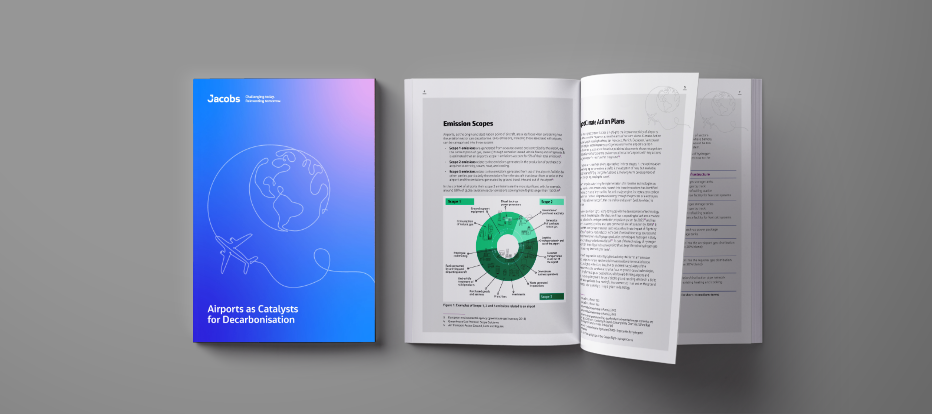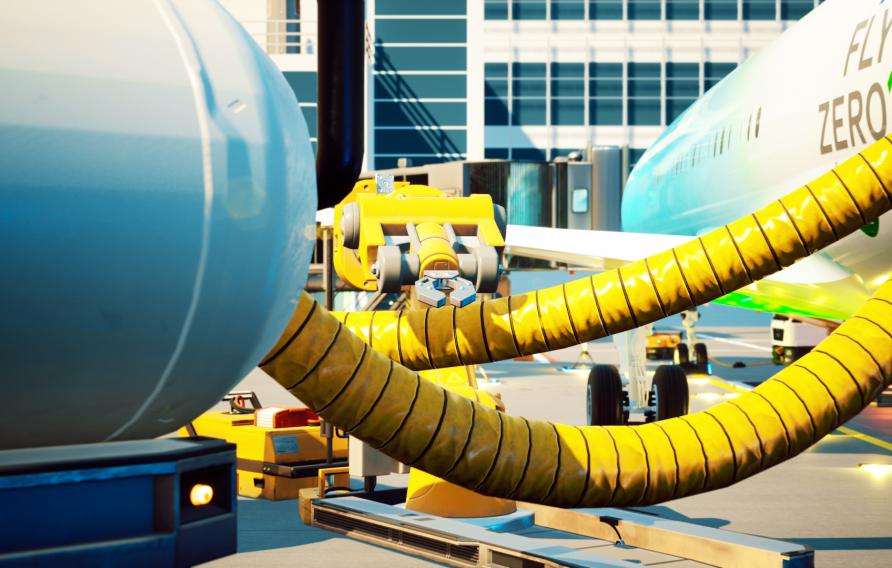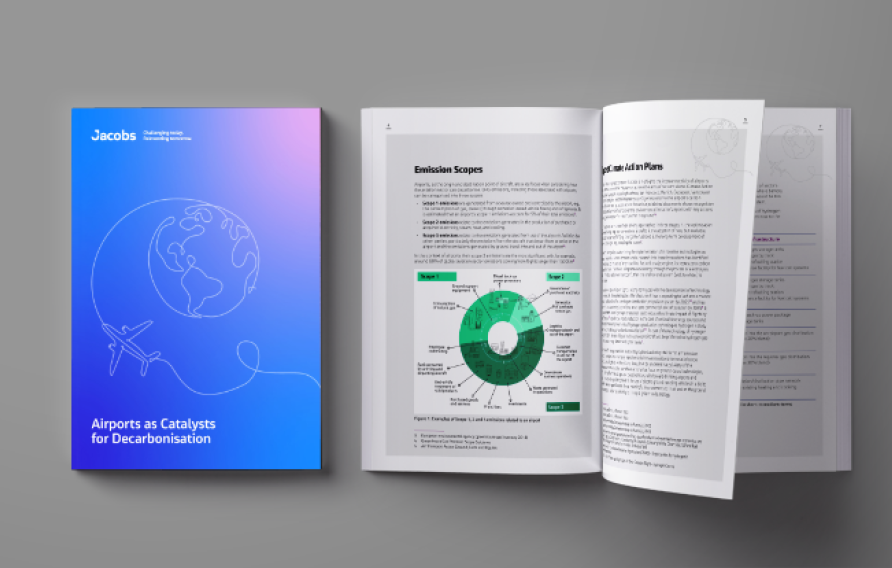
Airport owners and operators need to plan for the delivery and storage of hydrogen now if they are to be ready to fuel hydrogen-powered aircraft which are expected by 2035. New research by Jacobs, "Airports as Catalysts for Decarbonization", provides a roadmap for airports to implement hydrogen fueling technologies, building on our work for the Aerospace Technology Institute FlyZero Report, "Airports, Airlines and Airspace - Operations and Hydrogen Infrastructure".
Due to the length of time it takes to plan, design, consult and implement new airport infrastructure, airports must make provisions ahead of the first commercially available hydrogen-powered aircraft expected in the early to mid-2030s.
To help airports transition, Jacobs identified three scenarios for the supply and storage of hydrogen:
Scenario 1 - the delivery of liquid hydrogen directly to the airport by truck.
Scenario 2 - the use of a hydrogen gas pipeline with on-site liquefaction.
Scenario 3 - the use of electrolysis for hydrogen production on site at the airport.
These scenarios can be used by airports on their own and also provide a route to scaling up hydrogen availability over time. For example, a large airport may start by implementing scenario 1 for fueling aircraft while the required infrastructure for the implementation of scenario 2 or 3 is being built.
The new roadmap provides airports with steps which can be incrementally implemented to ensure hydrogen-powered flights are able to take off as soon as aircraft are available. It recommends that airports start with providing airside hydrogen gas storage and refueling stations in time for the first flights, before developing more advanced liquid hydrogen storage and gas pipelines for fueling planes by the early 2050s.
These sources will be able to provide power beyond the planes and airport infrastructure. The report suggests hydrogen gas blending could power heating in terminals by the mid-2040s eventually moving to 100% hydrogen gas heating in the 2050s. If an airport can produce hydrogen through electrolysis on-site, it could become an energy hub for its local community. This would provide businesses, public services and homes with carbon neutral power, generating social value.
“Early adoption of fueling infrastructure is critical to the implementation and success of hydrogen-fueled aircraft. Hydrogen has the potential to be a core component for the decarbonization of aviation. ”
“Early adoption of fueling infrastructure is critical to the implementation and success of hydrogen-fueled aircraft,” says Jacobs Global Solutions Director for Aviation Andrew Gibson. “Hydrogen has the potential to be the core component for the decarbonization of aviation. Airport operators and owners must build partnerships with local businesses and other transport operators to initiate the use of hydrogen in the immediate term.
“By incrementally building the hydrogen supply and distribution of infrastructure from a short-term starting point, airports can be ready for hydrogen-powered planes as soon as they are commercially viable,” he adds.
Emissions generated from flights account for most of an airport’s climate impact. Around 80% of global aviation sector emissions come from flights longer than 1,500 km. It’s estimated that the use of hydrogen powered aircraft could reduce the climate impact of flights by 50-75%. Airbus has identified a hydrogen-combustion propulsion system to potentially provide a net-zero commercial aircraft by 2035.
You might be interested in...
-
 Showcase
ShowcaseMeet Andrew Gibson
Andrew Gibson has over 30 years of experience in the design, construction and planning of airport infrastructure both as a client and a consultant, undertaking projects in the U.K., Europe, India, Latin America and Africa.
-
 News
NewsReport: Zero-Carbon Flights Could Enter Service by 2035
Jacobs delivered industry-leading advisory services to FlyZero, the U.K. study into zero-carbon emission commercial air travel, in its vision for a new generation of aircraft powered by hydrogen.
-

 Report
ReportAirports as Catalysts for Decarbonization
New Jacobs research provides roadmap for the future of hydrogen plane fueling, ready for the first hydrogen-powered aircraft expected by 2035.
-
 Page
PageAviation Solutions
How Jacobs is turning the world’s airports into a destination - from feasibility studies to transformative programs – we’re delivering the future of aviation.
-
 News
NewsReframing the Future of the Aviation Industry through a Multi-Sector Lens
Drawing insights from healthcare, retail, transportation and smart cities, Jacobs Joseph Butler spoke about the opportunities that are reframing the future of the aviation industry at the Australian Airports Association (AAA) Virtual National Conference.
-

 News
NewsJacobs Launches New Climate Action Plan and Climate Commitments
Jacobs sets out ambitious new climate commitments in its updated Climate Action Plan in celebration of Earth Day 2022.















































